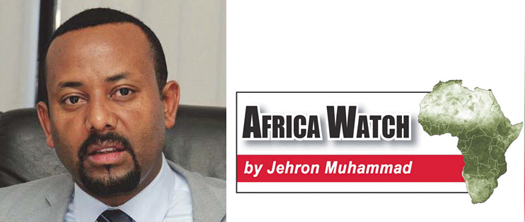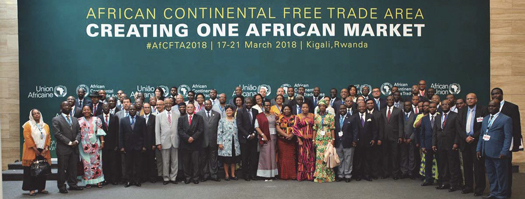Ethiopia prime minister tells UAE Crown Prince: ‘You’ve lost the religion’
By Jehron Muhammad | Last updated: Aug 8, 2018 - 12:06:26 PMWhat's your opinion on this article?

Ethiopia Prime Minister Abiy Ahmed
|
Ethiopia has begun a dramatic turnaround. Already this year, after facing widespread unrest and violent protests against a government that appeared unresponsive and entrenched, new Prime Minister Abiy Ahmed has led a “dramatic turnaround.”
Elected by the ruling coalition’s executive council after his predecessor, Hailemariam Desalegn, abruptly resigned, Ahmed has initiated sweeping reforms, boosted civil liberties and quelled dissent by closing prisons and releasing hundreds of political prisoners. He also admitted that the government has been involved in torturing its citizens.
Completing the last leg of a United States tour designed to connect the homeland with the Ethiopian Diaspora, he encouraged the Diasporans to return home and add to the changes that are unfolding.
During the first leg of his U.S. tour, which included a White House meeting with Vice President Pence and a speech in Virginia to the American-Ethiopian Muslim community, he said, he had shunned an offer by Abu Dhabi Crown Prince Mohammed bin Zayed to build an Islamic center in the East African country by telling him that he had “lost” his religion.
Recalling the conversation with the crown prince, considered the defacto ruler of the United Arab Emirates, Ahmed recalled bin Zayed saying, “We will help you with many things. We will teach you,” he allegedly said during a private conversation with the prime minister.
Ahmed said he replied, “We don’t need to learn the religion from you. You’ve lost the religion. What we need is to learn Arabic quickly, so we could better understand the religion and teach it to you, and return you to it.”
When bin Zayed asked him why, Dr. Ahmed responded that Islam is about peace, unlike what is happening in the Middle East.
“You have lost the religion,” Ahmed said he told the crown prince.
During the prime minister’s visit to Washington, D.C., and stops in Minneapolis and Los Angeles, 20-year-old Abigail Mesfin, who is in D.C. for a summer program at John Hopkins, said, “I see a different future for Ethiopia than I ever have and I’ve always been proud of my country but now I have a future to be proud of as well.”
Mayor Muriel Bowser declared July 28 as “Ethiopia Day in D.C.”, drawing a roar of applause from an audience waiting to hear from the prime minister. Supporters waved a variety of flags, side by side, as they cheered on the prime minister.
African economies harmonizing cross border trade liberalization

African Continental Free Trade Area conference members.
|
One of the central goals of the African Union’s African Continental Free Trade Area (AfCFTA) is to boost African economies by harmonizing cross border trade across sub-regions and at the continental level. This continent-wide liberalization of trade along with the movement of Africa’s population could unquestionably facilitate substantial growth. Freer movement between nation states would encourage, not only trade, but tourism and investment between African countries. In addition, it would allow students to study in different African countries and allow Africans with suitable skills to find rewarding jobs.
Implementation of the continent-wide “open African borders” policy has been divided into three phases, which include the right of entry and abolition of visa requirements, the right of residence and the right of establishment, which includes investment and setting up businesses.
According to TheConversation.com, the African Union “recognizes the lack of readiness of many domestic and continental arrangements that would allow the immediate full implementation of the protocol. Some countries have population registration and passport systems which lack integrity, some have weak border management, and some have poor security intelligence.”
Other concerns could include worsening of brain drain of talent from poorer countries.
Though there are obstacles, African Union chairperson and Rwandan President Paul Kagame describes AfCFTA as “among the most historic achievements of the African Union.” He said “an African Union capable of delivering a functional free trade area is actually the end point of the reform.”
Kagame said the AU was nullifying perceptions that it couldn’t deliver a free trade area. Interests outside Africa would be “recalculated” and so it was crucial for Africa to speak with one voice, he added.
Can the momentum for an integrated Africa continue?
Five more countries, reported issafrica.org, recently signed up to join the AfCFTA. Another question is which country will ultimately host the new free trade area?
During an AU summit held in Mauritania, Burundi, Lesotho, Namibia, Sierra Leone and South Africa signed the agreement, alongside 44 nations that signed on in Kigali in March. Forty-nine nations have signed onto the agreement.
At a recent AU summit Ghana and eSwatini (formerly Swaziland) raised their hands to host the secretariat. Nigeria was the logical choice, but because of internal concerns with local manufacturers, nothing will happen until after the country’s 2019 elections. Nigeria had led plans to get the AfCFTA up and running.
Issafrica.org reported there is a great expectation in the African Union that the required “minimum of 22 ratifications is feasible and that the AfCFTA will come into being” at the next AU summit. Muhammad Issoufou, Niger’s president and the AU’s champion on the free trade agreement, is reportedly already planning a big gathering to celebrate next year.
Follow @JehronMuhammad on Twitter.
INSIDE STORIES AND REVIEWS
-
-
About Harriett ... and the Negro Hollywood Road Show
By Rabiah Muhammad, Guest Columnist » Full Story -
Skepticism greets Jay-Z, NFL talk of inspiring change
By Bryan 18X Crawford and Richard B. Muhammad The Final Call Newspaper @TheFinalCall » Full Story -
The painful problem of Black girls and suicide
By Charlene Muhammad -National Correspondent- » Full Story -
Exploitation of Innocence - Report: Perceptions, policies hurting Black girls
By Charlene Muhammad -National Correspondent- » Full Story -
Big Ballin: Big ideas fuel a father’s Big Baller Brand and brash business sense
By Bryan Crawford -Contributing Writer- » Full Story






 Click Here Stay Connected!
Click Here Stay Connected!








